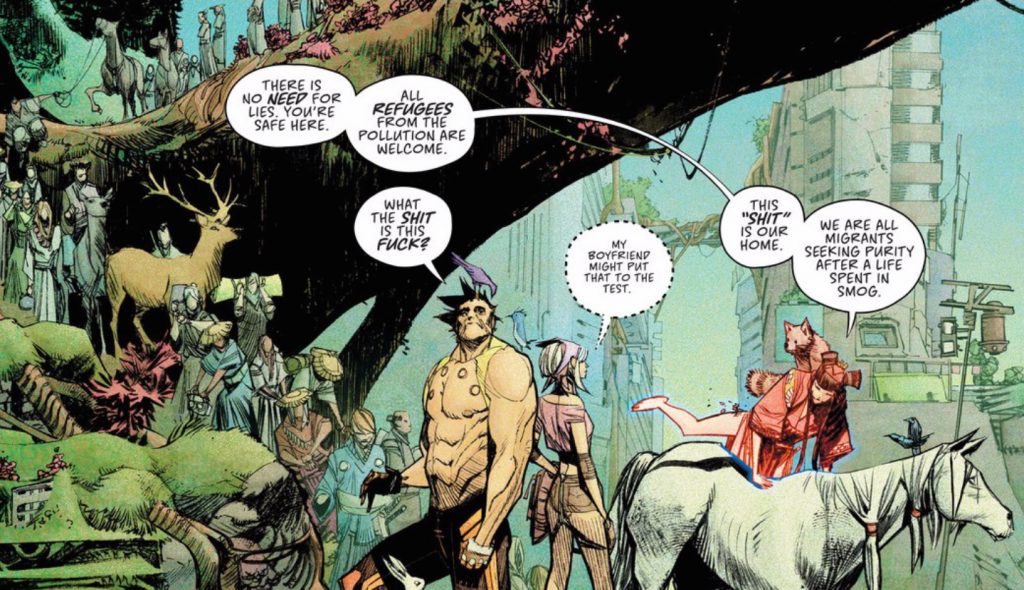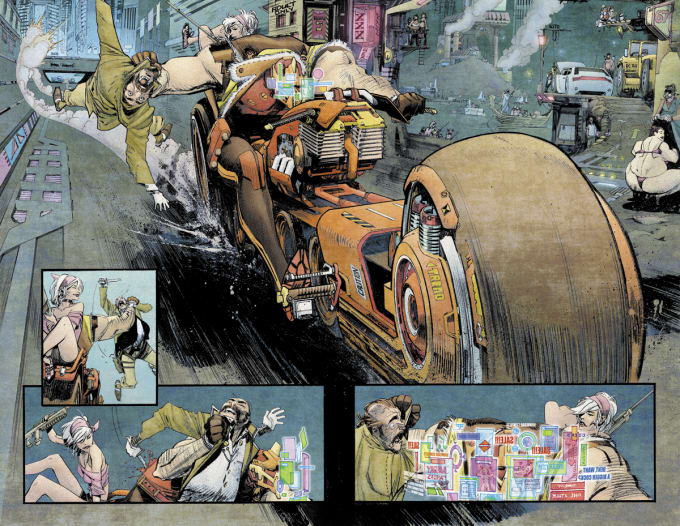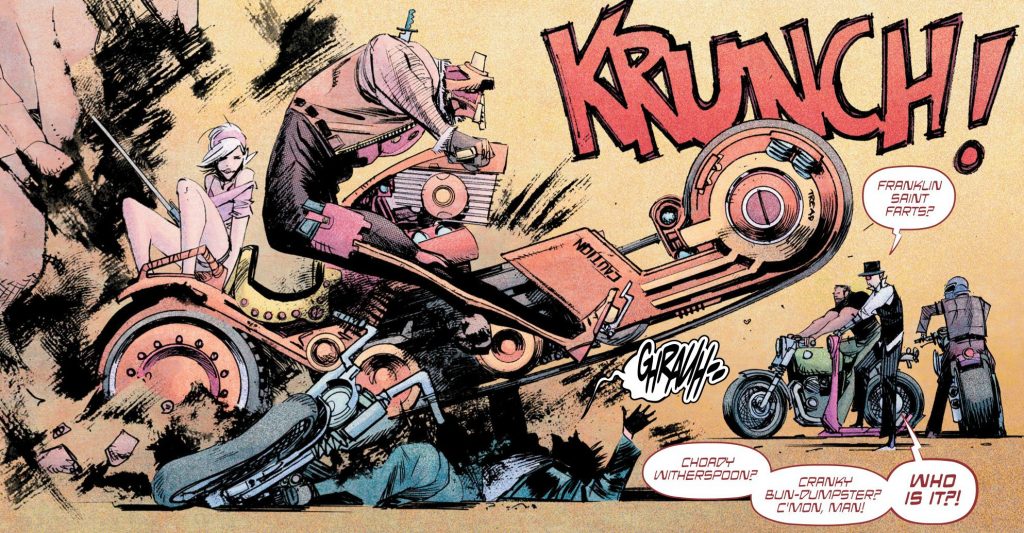- Tokyo Ghost
Science fiction has long been trying to answer the question of whether technology is likely to bring more good or more ill to humanity and society in general and in large part, cyberpunk has been a part of that conversation. Whether it’s Ghost in the Shell or Neuromancer or Battlestar Gallactica, technology often comes back to bite us in the ass. While I enjoy stories that make you question overreliance on technology, I think that it has an unfortunate tendency to devolve into technophobia and “all corporations are eeeeeevil!” kind of discourse. This week, I’m taking a look at a series that takes the dark side of technology and extends it to its furthest point. Tokyo Ghost is written by Rick Remender and illustrated by a team including Sean Gordon Murphy, Matt Hollingsworth and Rus Wooton. Published last year by Image Comics, it is an interesting mix of violence and social introspection and at only two volumes (ten issues total) is a very quick read.
Tokyo Ghost takes place in a very Judge Dredd-esque future in which humanity has so stripped nature of resources that most of humanity would rather escape into virtual reality than deal with real life. The story is set in Los Angeles which has become its own nation, with robots taking over all manual labor and much of humanity at a subsistence level of boredom that is only alleviated by the many flashy virtual reality channels that all tune into and never come out of if they can help it. Violent arms of the law (as well as the big and powerful) known as Constables enforce the rules and one pair, Constable Led Dent and his partner Debby Decay, are tasked with investigating the last bastion of tech-free society, Tokyo. Tokyo is rumored to be a veritable Garden of Eden protected by a samurai warlord. In return for helping a businessman gain access to it, Led and Debby will be granted freedom from Led’s position as Constable and the dependence on the stimulants that inherently comes with the job.
Tokyo Ghost is a masterpiece of technophobia and cynicism and I hated so much of it. The future that Remender envisions is like Judge Dredd if it was written by Bill O’Reilly. Debby is one of the only tech-free residents of LA and the wonders of not touching the evil, corrupting virtual reality is expounded again and again….and again. While I think there’s cause for concern in terms of not ignoring the outside world in favor of technology, this is the polar opposite. This isn’t a subtle reminder to question how much you use technology for everything, it’s a sledgehammer to the brain telling you that all tech is evil. Technology reduces us to mindless hordes who are only satisfied with extreme violence, flashy pictures and gamer slang that no gamer actually uses outside of 4Chan and Reddit. Even the villain is boring. He has the psychopathic tendencies of Handsome Jack (Borderlands reference for those who haven’t played the videogame series) but none of the charm or subtlety. I have an extreme dislike of stories that don’t let readers come to their own conclusions and just hamhandedly force the author’s opinions down the readers’ throats and that’s exactly how I felt about the plot and much of the setting of Tokyo Ghost.
If there’s a few bright spots, it’s the complicated, nuanced relationship between Deb and Led and the artwork. When he’s at his best, Remender is a master at crafting flawed characters with intriguing relationships that are often as terrible as they are compelling. While I hated most of the rest of the aspects of the series, Deb and Led have a complicated codependent/addict relationship that’s fascinating. Debby was raised by her father to enjoy the outside world and not get lost in the consuming technology like everyone else and yet the neglect she faced from her mother (who was too sucked into virtual reality to pay attention to her child) meant that after her father’s death, Debby was essentially all alone. Led was alternately abused and neglected by similarily technology addicted parents as a child and is obsessed with being strong enough to protect Debby. His inherent physical weakness is what drove him to become a drug addicted Constable in the first place and what continually leads him back to the drugs even as they numb his mind and draw him further into virtual reality. Debby’s struggle to get Led clean and draw him out of that consuming addiction and her inability to leave him when he goes back to it time after time made for such an intriguing dynamic. It’s a shame that the rest of the setting didn’t measure up to the nuances of the relationship.

I liked Murphy’s art in Chrononauts but this just blew that away. Amazing work by both illustrator and colorists.
And the artwork! For all the constant sex, nudity and extreme violence, the art is absolutely gorgeous. The cyberpunk setting comes to vivid life with the intense amount of detail and thought put into it by Murphy and the bright, (intentionally) garish LA coloring as contrasted to the naturally beautifully coloring done for Tokyo by Wooton and Hollingsworth. While it can be difficult to slow down due to all the action, this is a story that is meant and deserves to be consumed panel by panel because it’s just brilliantly illustrated.
Tokyo Ghost is a story that I wanted to like. It’s been well received and liked in general, has been lauded as original and compelling and has a lot of the facets of cyberpunk that I love. Unfortunately, it hammers the technophobe theme to the exclusion of all else and feels like the rantings of someone who thinks that videogames rot your brains. The setting and plot are mostly obnoxious and are saved only by the gorgeous artwork and nuanced relationship of the lead characters. I can’t say I’d recommend it to most but if you like cyberpunk and don’t mind the intensely anti-technology, anti-corporation attitude, it may be more appealing to you than it was to me.
– Cait



